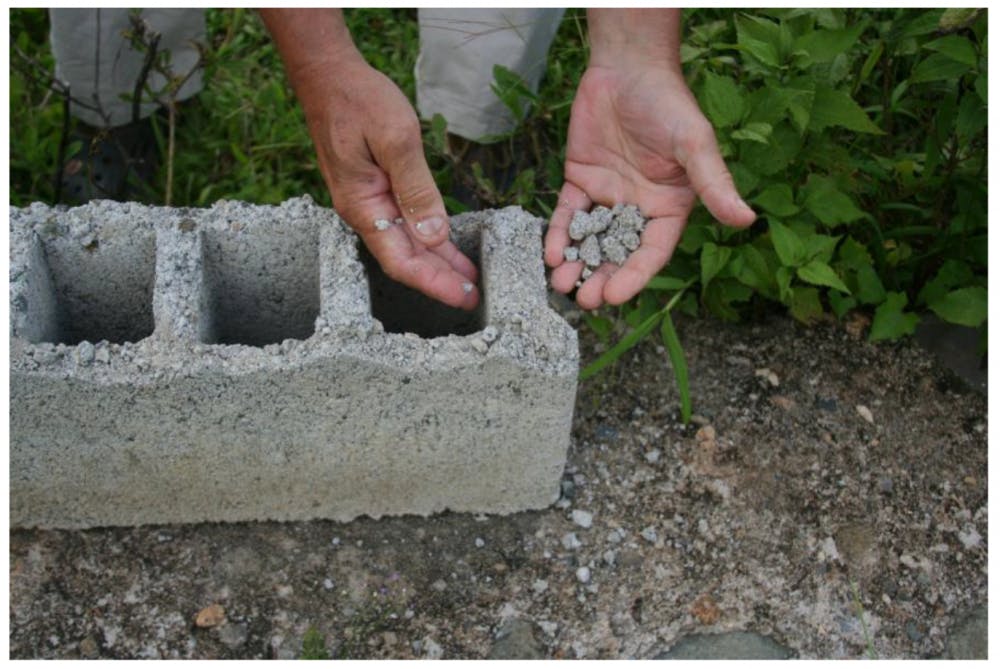After a 7.0 magnitude earthquake hit Haiti in 2010, the nation was forced to rebuild much of its infrastructures and buildings.
Ball State professor emeritus of architecture Anthony Costello has been visiting Haiti since 2001, and witnessed the damage firsthand. It was during the visits that he realized the poor quality of the concrete blocks, which are Haiti’s main construction material.
The problem with Haiti's concrete blocks was the drying process. While the United States uses kilns to dry blocks, Haitians dry their blocks in the sun — a method Costello said inhibits the block’s ability to maintain moisture to remain strong.
“It was obvious that the concrete block was so weak that it would never have resisted the earthquake forces,” he said. “They put [the concrete block] in the sun and all the moisture evaporates. You can literally break off pieces of the block, that’s how weak it is.”
The National Concrete Masonry Association Foundation and the Midwest Masonry Council provided the funding for a project-based learning class, in which Costello challenged his students to develop a cheap, easy method to build and use a kiln.
Ball State alumnae Anne Schnitzenbaumer, Melissa Schnulle and Madaline La Plante met that challenge. In 2010 they designed SOLtek, a kiln built out of PVC pipes and black visqueen — a type of plastic sheet — for the class.
The student-designed kiln works by trapping and using solar heat more efficiently. Costello said the kiln-cured blocks have been able to withstand up to 1,400 pounds per square inch. Prior to this project, Haiti’s sun-baked blocks withstood 300 psi.
SOLtek received an honor award from the American Institute of Architects Indianapolis in 2017 for the design of the project and special recognition for the thought behind the project.
Students in Costello’s 2016 class won an award in the 2016 National Concrete Masonry Association Foundation Unit Design Competition for their work on an interlocking concrete block design.
Alumni Reva Derhammer, Bryce Derhammer, Alex Thomas and Reed Thompson developed the idea for interlocking block concept after being challenged by Costello to design a block that is naturally earthquake resistant.
Reva said the team wanted to design a block that could withstand earthquake forces and be built with little mortar.
“We wanted the Haiti block to be a successful, resilient alternative to the way the Haitians currently construct buildings,” Reva said. “They notoriously don’t use mortar for their masonry building blocks because of the lack of resources. The block is designed in a way that it doesn’t need mortar.”
Both SOLtek and the interlocking block were noticed by Architect Magazine, and both projects won an honorable mention in the 2017 R&D Awards Program.
“Between the two [projects], we’re very proud,” Costello said. “For me as an educator there’s no finer reward than to see the work that can come out of an academic pursuit. It’s not done yet, but we’re optimistic for the future.
That future, Costello said, involves the spread of the design, as well as being able to teach Haitian masons how to use it.
“If you don’t have education, if you don’t go out and show people how to use things, they’re not going to use them correctly,” he said. “All the work that you’d hope would be accomplished simply won’t be done.”
Costello hopes to go back to Haiti this summer to build the first full-scale model of the SOLtek kiln and to build and cure the interlocking blocks in it for the first time.
Contact Dylan Grissom with comments at dylangrissom@gmail.com.


![A member of Open Door Health Services [ODHS] Connections Team meets with a resident and assists them with enrolling in a health insurance plan in 2024. CEO and President of ODHS Bryan Ayars said around 10%-11% of their patients they see are uninsured. ODHS, Photo provided](https://snworksceo.imgix.net/bsd/6f04939c-59ef-4f5b-930d-1ab3f45749c1.sized-1000x1000.jpg?w=1000&ar=4%3A3&fit=crop&crop=faces&facepad=3&auto=format)


